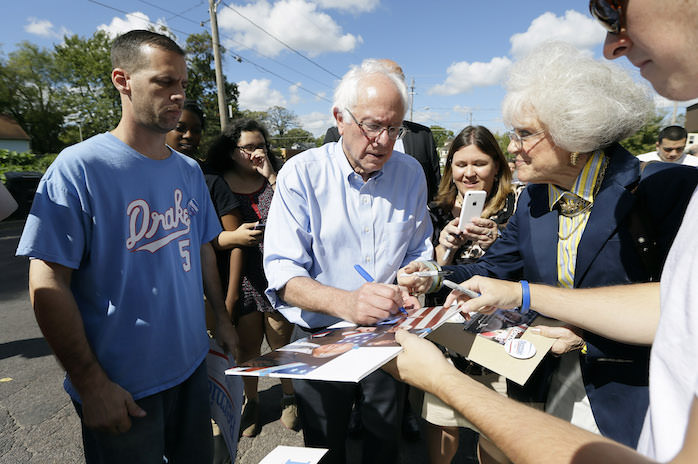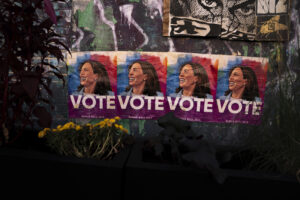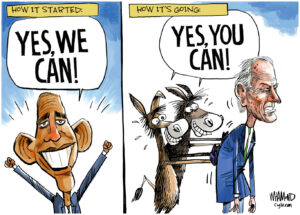The Grass Roots Are Getting Greener for Sanders, but Will They Wither?
The test is whether an ad hoc volunteer movement, started by issues-oriented progressives, can be converted into a political revolution. Democratic presidential candidate Sen. Bernie Sanders, I-Vt., signs autographs after speaking at the Des Moines, Iowa, Youth Summit on Sunday. (Charlie Neibergall / AP)
Democratic presidential candidate Sen. Bernie Sanders, I-Vt., signs autographs after speaking at the Des Moines, Iowa, Youth Summit on Sunday. (Charlie Neibergall / AP)
While pundits and political insiders wait for Vice President Joe Biden to make up his mind and watch Hillary Clinton’s latest attempt to seem more likable, Sen. Bernie Sanders is steadily building a grass-roots organization determined to fight for his progressive ideas through Election Day and beyond.
The Biden and Clinton stories are examples of the superficiality of presidential campaign coverage. Waiting for Biden produces no news, just website traffic because of his name. No heavy reporting or analysis is needed. It’s the same with Clinton events, such as her learning to do the Nae Nae on Ellen DeGeneres’ TV show.
Sanders is all seriousness, brushing off questions about his appearance and other silliness with the impatience of a man on a more important mission. From what I’ve seen and heard from Sanders supporters, that’s why they are behind him.
“I am trying to create the political army to support this political revolution,” Lauren Steiner, a leader of California Sanders volunteers, told me recently over coffee near UCLA.
Other Sanders supporters also embrace the idea of an effort that could extend beyond Election Day. “I think that Bernie serves as a huge inspiration for students who have grown up in a world where they’ve been undercut time and time again due to corruption or incompetence and have grown accustomed to the feeling that their voice can’t do much for themselves,” Justen Teguh, a student at the University of California, San Diego, told me in an email. “He has a policy which is great for those attending college, yes, but he’s also been putting a lot of focus on the power that the people collectively have and our responsibility to use it.”
Harnessing that power during and after the election is the linchpin of the Sanders campaign. The Vermont senator feels Obama and his team blundered by letting its effective 2008 election campaign organization, with its huge lists of supporters, fall into neglect in the post-election period.
“Change will take place when tens of millions say enough is enough,” Sanders told former Obama adviser David Axelrod on a new podcast, “The Axe Files with David Axelrod.”
“We are seeing that in the fight for the $15 minimum wage. Change comes at the grass-roots level … this is what this campaign is about.
“As you know, I am personally very fond of Barack Obama,” said Sanders. “But here is an area where we have a political disagreement.” Obama, he said, after a “brilliant campaign,” thought he could sit down with Republicans and negotiate. “It was a mistake he made because he is a decent guy.” But the Republicans “had no desire to negotiate” and “it took him too long to realize it.”
Sanders said “tens of millions of people are going to [have to] stand up the day after the election. … In terms of the governing process, I can’t do it alone, Barack Obama couldn’t do it alone.”
Sanders said he said he thinks most Americans agree with him on his advocacy for the minimum wage, free college tuition, family leave, rebuilding of the nation’s infrastructure and other issues. “I am not saying every position I advocate has a majority support, but a lot of them do. … The views I am talking about represent the views of the vast majority of the American people … the political dynamic of the moment is the views that progressives hold.”
Right now, Sanders and his small staff are assembling a team of volunteers and paid workers for the campaign against Clinton and possibly Biden. I got an idea of how it works when I talked to Elizabeth Siyuan Lee, a junior majoring in philosophy at Middlebury College in Vermont. Lee founded College Students For Bernie.
“Without social media, it would not have gotten off ground,” she told me when we talked on the telephone.
“It started with a Facebook page in April of this year,” she said. “I woke up in the morning, knew I was in support of him, so I saw there was [an] invitation [for] University of Chicago Students For Hillary. So I started Middlebury Students For Bernie … then we decided to form College Students For Bernie. We started contacting people we knew … the first 15 to 20 schools were the most difficult, but the applications started to snowball.”
During the summer, Lee was in Washington, D.C., working as an intern, when she met the leader of Sanders’ digital team and Sanders himself, who was about to speak on the phone to dozens of campaign house parties around the country. “He actually engaged in conversation with us about stopping mass incarceration, trying to get real answers out of us and listen [to those answers].” That meeting led to College Students For Bernie becoming part of the national campaign organization.
It’s happening around the country, as self-starting volunteers like Lee and Lauren Steiner begin to bring their organizations into a national structure without losing the autonomy and enthusiasm they brought to the Sanders campaign.
Last week, after we met near UCLA, Steiner invited me to listen in on a three-hour telephone conference for California volunteers. The callers gave me a good sense of the extent of Sanders’ grass-roots activity. They numbered about 115, with most coming from the San Francisco Bay Area, Los Angeles and Silicon Valley. They reported on how they were setting up phone banks for calls to Iowa, where Sanders will be competing in the caucuses; arranging watch parties for the Oct. 13 Democratic presidential debate; campaigning among African-Americans, Latinos and Asian-Americans and beginning the process of electing Sanders delegates to the national convention. “Don’t be negative,” one participant warned. “You’re not going to convert Hillary people that way.”
So far, such efforts around the country have produced about 1 million online contributors, Patrick Healy reported in The New York Times, and some $26 million since July, almost equaling Clinton’s $28 million for the period. And they have also helped generate the big crowds at Sanders’ rallies.
The contributions have made political reporters finally take note of Sanders. The test now is whether a serious-minded volunteer movement, started in an ad hoc way by issues-oriented progressives, can be converted into a political revolution. Lauren Steiner and the others hope it can and that it will last until Election Day and long afterward.
Your support matters…Independent journalism is under threat and overshadowed by heavily funded mainstream media.
You can help level the playing field. Become a member.
Your tax-deductible contribution keeps us digging beneath the headlines to give you thought-provoking, investigative reporting and analysis that unearths what's really happening- without compromise.
Give today to support our courageous, independent journalists.








You need to be a supporter to comment.
There are currently no responses to this article.
Be the first to respond.